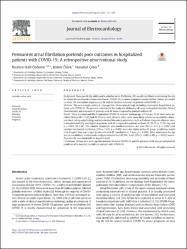| dc.contributor.author | Özdemir, İbrahim Halil | |
| dc.contributor.author | Özlek, Bülent | |
| dc.contributor.author | Çetin, Nurullah | |
| dc.date.accessioned | 2021-02-23T08:05:07Z | |
| dc.date.available | 2021-02-23T08:05:07Z | |
| dc.date.issued | 2021 | en_US |
| dc.identifier.citation | Özdemir İH, Özlek B, Çetin N. Permanent atrial fibrillation portends poor outcomes in hospitalized patients with COVID-19: A retrospective observational study. J Electrocardiol. 2021 Feb 8;65:113-120. doi: 10.1016/j.jelectrocard.2021.01.016. Epub ahead of print. PMID: 33601308; PMCID: PMC7869683. | en_US |
| dc.identifier.uri | https://doi.org/10.1016/j.jelectrocard.2021.01.016 | |
| dc.identifier.uri | https://hdl.handle.net/20.500.12809/8966 | |
| dc.description.abstract | Background: Data specifically addressed to whether atrial fibrillation (AF) would contribute to increasing the risk for severe forms of novel coronavirus disease (COVID-19) or worse prognosis remain unclear. Hence, we sought to assess the association of permanent AF with in-hospital outcomes in patients with COVID-19.
Methods: This was a single-centered, retrospective, observational study including consecutive hospitalized patients with COVID-19. The primary outcome for the study was defined as all cause in-hospital mortality. Clinical characteristics and outcomes of patients with AF were compared to patients without AF.
Results: Three hundred and fifty hospitalized COVID-19 patients (median age of 55 years, 55.4% men) were enrolled. Of them 40 (11.4%) had AF. Patients with AF were older; were more likely to have co-morbidities, abnormal chest radiography findings and deteriorated laboratory parameters such as D-dimer, troponin, albumin, urea. In-hospital mortality was higher in patients with AF compared to patients without AF (32.5% vs. 13.5%, log-rank p = 0.002, RR 2.40). The number of patients who needed intensive care unit (55% vs. 31%, p = 0.002) and invasive mechanical ventilation (35% vs 15.2%, p = 0.002) were also higher in the AF group. In addition, length of in-hospital stay was longer in patients with AF (median 8 vs. 7 days, p = 0.008). After adjustment for age and co-morbidities, multivariable analyses revealed that AF (HR: 2.426, 95% CI: 1.089-5.405, p = 0.032) was independently associated with in-hospital death.
Conclusions: AF was seen with together markers of severe COVID-19, and the presence of AF was an independent predictor of in-hospital mortality in patients with COVID-19. | en_US |
| dc.item-language.iso | eng | en_US |
| dc.publisher | Elsevier | en_US |
| dc.relation.isversionof | 10.1016/j.jelectrocard.2021.01.016 | en_US |
| dc.item-rights | info:eu-repo/semantics/openAccess | en_US |
| dc.subject | Atrial fibrillation | en_US |
| dc.subject | COVID-19 | en_US |
| dc.subject | Mortality | en_US |
| dc.subject | Outcomes | en_US |
| dc.subject | Prognosis | en_US |
| dc.title | Permanent atrial fibrillation portends poor outcomes in hospitalized patients with COVID-19: A retrospective observational study | en_US |
| dc.item-type | article | en_US |
| dc.contributor.department | Eğitim ve Araştırma Hastanesi | en_US |
| dc.contributor.institutionauthor | Özlek, Bülent | |
| dc.identifier.volume | 65 | en_US |
| dc.identifier.startpage | 113 | en_US |
| dc.identifier.endpage | 120 | en_US |
| dc.relation.journal | Journal of Electrocardiology | en_US |
| dc.relation.publicationcategory | Makale - Uluslararası Hakemli Dergi - Kurum Öğretim Elemanı | en_US |


















